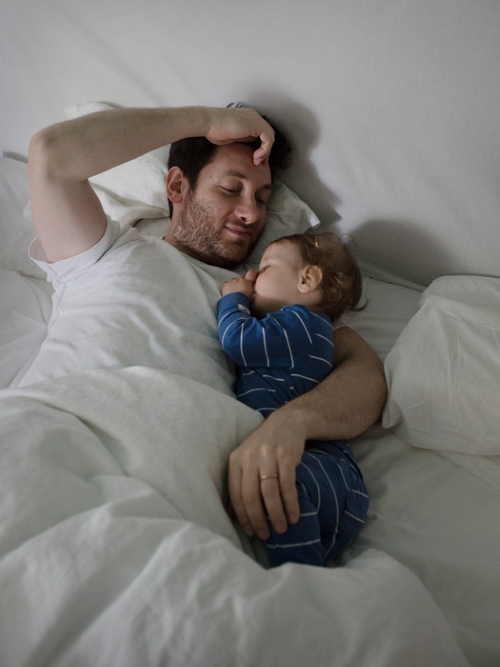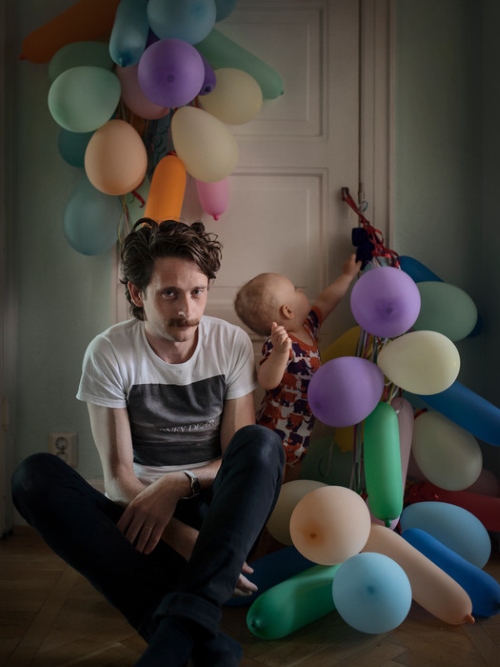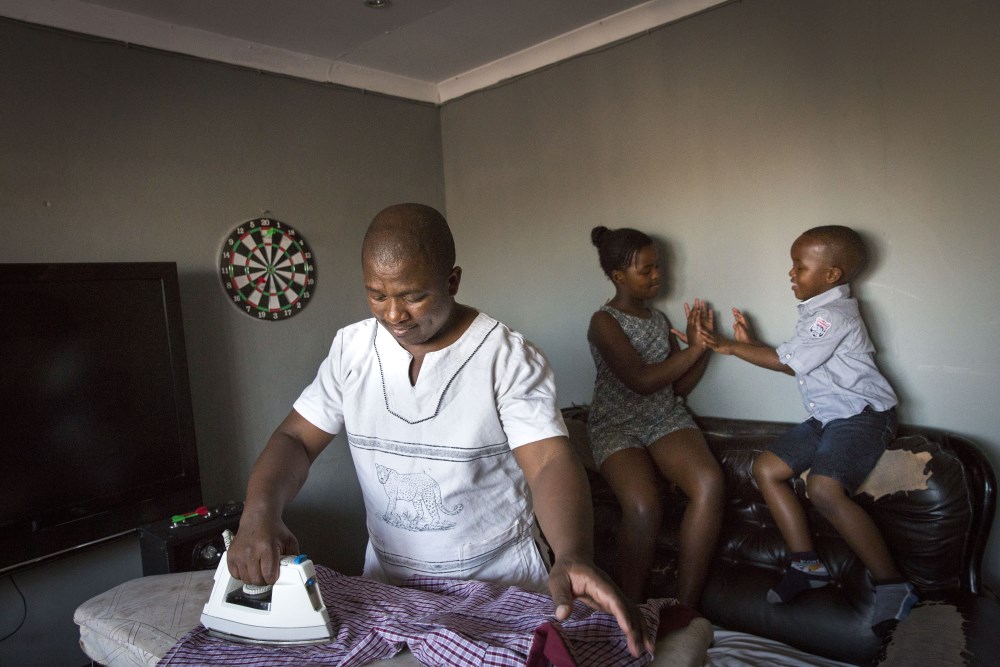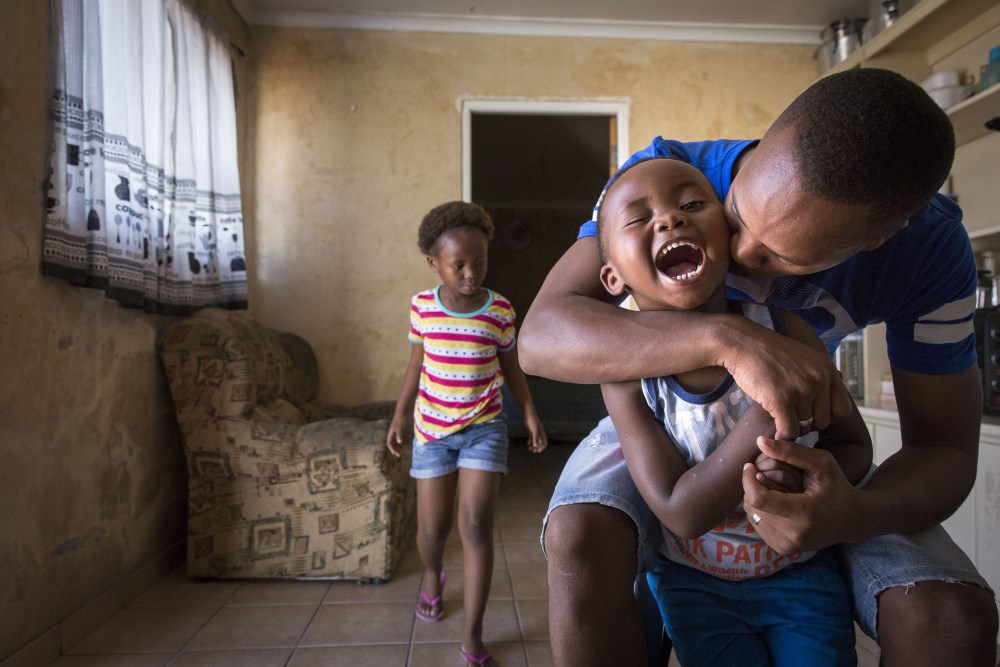I felt like I had been present at the birth of his child.
Sisa had taken a video of his son’s first cries, and we were reviewing the footage for inclusion in a short film about fatherhood. Huddled quietly together in a dark studio with surround sound, the tsunami of baby cries rocked us to our core.
If you have ever been at the delivery of a child you’ll know what I’m talking about (and then turn that volume up times five!). It was a moment I’ll never forget; the echo still reverberates years later when I bump into Sisa at a shopping centre in Cape Town.
The film we made in 2013 tells the story of Sisa’s first days as a father and how a small group of friends supported the couple through their pregnancy and delivery.
Sisa was a member of a fathers’ group in his neighbourhood in Mfuleni. Inspired by a Swedish fathers’ programme, the group met every Friday afternoon. The idea: new dads and dads-to-be would get together before and after the delivery of their children and talk about their expectations, plans, hopes and fears.
As a member of the team that ran the project from 2012 to 2013, I learnt many important lessons, one of them being that running a fathers’ group in Mfuleni, Cape Town, is different from running a fathers’ group in Sodermalm, Stockholm.
In a Swedish fathers’ group, a big topic is usually how the fathers will spend their parenting leave. A common arrangement is that, of the 16 months of paid leave available to parents, mothers use 10 months and fathers six. In South Africa, where fathers do not have paternity leave, discussions tend to centre on how to make ends meet financially and still be an involved parent.


Paternity leave, or gender-equal parenting leave, is an important policy measure towards gender equality. At a basic level it allows fathers to do their share of domestic and care work, especially during the “intensive care” period – the first 1,000 days of a child’s life. This is the time from conception to more or less the child’s second birthday, and is an important focal point for policy makers to ensure children receive the best care they can in the most significant developmental period of their life.
One policy intervention towards this is the provision of parental leave for fathers.
Duty of care
As women have increasingly entered the paid workplace over the past century, men have not kept pace in taking up the care work at home. The movement for the recognition, reduction and redistribution of care work is receiving increasing attention on the global stage.
The MenCare Global Fatherhood campaign goal that men do 50% of the care work in the world was mentioned at the recent G7 summit in Canada by the gender advisory council to the G7. The signal is clearly being sent to national governments that it’s high time care work be regarded as everyone’s work, and progressive leaders are responding.
In South Africa, our labour law framework only allows for maternity leave, but this is about to change. A progressive bill is due to be approved by the National Council of Provinces that will introduce 10 days of leave for parents who do not qualify for maternity leave.
The largest group of parents who will receive this paid leave will be fathers. The bill uses gender-neutral language, thereby allowing for parents of all sexual orientations and gender identities to benefit. Ten days is hardly equal leave for all parents, but it’s a step in the right direction.
Cultural shifts
Law reform alone is not enough to change behaviour. Even in Sweden, new fathers typically only use about a third of the leave available to them. Another piece of the puzzle to change behaviour is to shift culture through new narratives, images and art.
One such example of “cultural work” is a series of photographs taken by Swedish photographer Johan Bävman. In 2016, he captured moments of fatherhood taken during the time that fathers took paternity leave.

The exhibition has been hosted in more than 100 countries around the world and is now being shown in South Africa along with a series of photos of South African fathers. This work of matching policy change with the dynamic spaces of cultural narratives is where new behaviours are sparked.
I bumped into Sisa when I was out shopping with my children. He happily announced that his son had just had his fourth birthday. I introduced him to my toddlers and we traded jokes about the intensity of caring for two children.
He enquired about the fathers’ groups and when the programme would start up again in his neighbourhood, since he would love to lead a group.
In that moment we decided we would start our own group just as soon as the new parental leave provisions are official and published in the Government Gazette, when more fathers will have the time to attend.
The Swedish and South African Dads photo exhibition opens on Father’s Day, June 17, at Central Square, Menlyn Maine in Pretoria and continues until Friday June 22. The exhibition is made possible by the Swedish Institute, the Embassy of Sweden in Pretoria, and Sonke Gender Justice. Follow @sonketogether, @MenCareGlobal and @SwedenInSA for updates.








